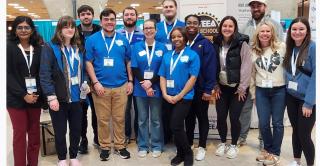
Central to Addressing Literacy Challenges.
Use your Central MS in Reading & Language Arts to make a difference in the lives of all students as they develop the literacy skills necessary for success inside and outside the classroom. Find inspiration to address today’s literacy challenges in one of four specializations.
Program Features
- Starts every January and August
- Attend full- or part-time
- Courses offered on-campus and online
- National recognition by International Literacy Association
- Alignment with International Dyslexia Association’s standards
- Financial aid is available
- No essay/interview required for admission
Program Options
Become a reading specialist or language arts consultant/literacy coach. Receive advanced certification in Remedial Reading & Remedial Language Arts (102 certification), as well as in Reading & Language Arts Consultant (097certification).
Become a reading specialist with the advanced certification in Remedial Reading & Remedial Language Arts (102 certification).
Enhance your reading and language arts pedagogical skills that will help you address the needs of diverse students in a classroom setting, without having to pursue advanced certifications in reading/language arts.
Enhance your pedagogy in literacy and numeracy and address the learning needs of diverse students in a classroom setting.


